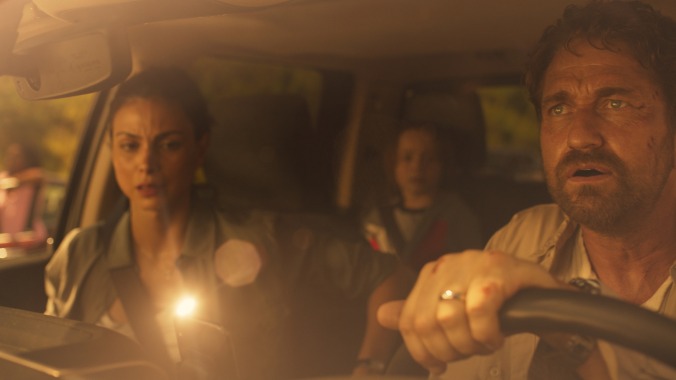Armageddon is free family therapy in the Gerard Butler disaster movie Greenland

If the disaster genre is to be believed, global cataclysms are nothing short of free couples therapy and family counseling. Why spend all that time trying to repair your marriage or become a better parent to your children when a couple days in the face of certain annihilation from alien invaders, asteroids, or extreme inclement weather will do the trick? Greenland is, in this respect no different. Pandemic be damned, our annual paint-by-numbers Gerard Butler movie is here, and if Paisley’s favorite son isn’t going to save the president or the planet, he’s at least going to save his family.
To be fair, Butler’s character, John Garrity, is less of a monomaniacal he-man than the star’s usual scowling, federally employed saviors. He’s a structural engineer whose marriage is already on the rocks before, well, actual rocks start falling from the sky—interstellar debris from a passing comet. The first one wipes out Tampa, with many more to come, including an extinction-event-sized “planet killer.” Not knowing that this was going to happen seems like seriously gross negligence on the part of the scientific community. But who’s got time to blame anyone when the whole world is running for cover?
Greenland’s script actually adds an intriguing wrinkle to the pre-apocalyptic scramble for safety. The Garritys—John, his wife Allison (Morena Baccarin), and their 7-year-old son Nathan (Roger Dale Floyd)—are gathered in the living room with their neighbors watching the first piece of comet debris enter the atmosphere on TV. Something has gone terribly wrong. The bolide in question hasn’t exploded in a light show over the Atlantic Ocean as promised. As reports of destruction start to come in, an emergency alert lights up on John’s phone—and no one else’s—followed by an automated call with instructions to pack a bag and report to a nearby Air Force base for evacuation to parts unknown.
It’s clear what’s going on. The days are numbered, and pretty soon CNN is going to air that 40-year-old tape of the military band playing “Nearer, My God, To Thee.” Some doomsday back-up plan has just been activated, and John and his family are part of it, while their friends and relations aren’t. Except, as the Garritys learn the hard way, their evacuation order was a mistake; they were supposed to have been removed from the list because of Nathan’s diabetes. As for where the apocalypse-proof bunkers might be, that’s a government secret. (It’s Greenland.)
It’s easy to imagine how a better film might pursue this cruel psychological experiment to the end—maybe even build to an ironic conclusion in which the predicted big event never happens. But this is a Gerard Butler movie. It answers to his gruff appeal and the lowest common denominators of a potboiler formula: reunite the family, avoid evil strangers, get to safety. At a certain point, one begins to wish that Butler were playing one of his sadistic hardasses, instead of an approximation of a remorseful everyman. We are meant to feel the violence here, but director Ric Roman Waugh (of last year’s Gerard Butler movie, Angel Has Fallen), doesn’t appear to have the chops to maintain a sense of tension past the nightmare scenarios of the first act.
Instead, we endure what feels like the extended cut of one of six concurrent plots in a Roland Emmerich movie, just to be treated to the big finale of fiery digital gum drops and cheap, cheesy effects. If a movie has to kill off most of the species in the name of the nuclear family, it should at least do it with some staging and style.